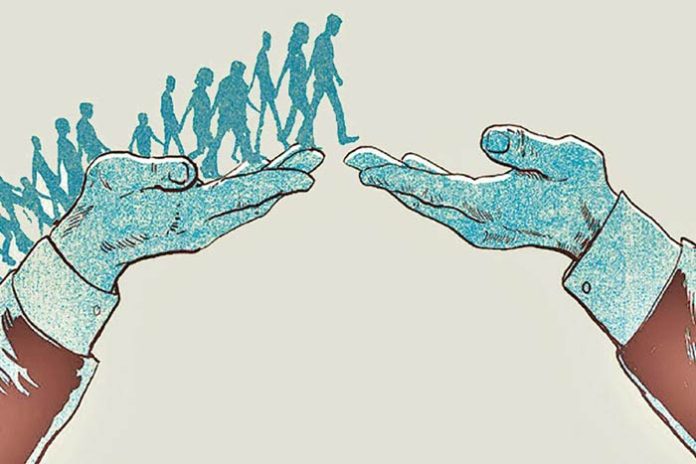Lt Gen Narendra Kotwal (Retd)
Humanity, at the pinnacle of its intellectual and technological progress, faces a paradoxical reality: the very advancements that empower us could precipitate our downfall. The undeniable urgency of issues such as climate change, resource depletion, and technological ethics necessitates a re-evaluation of our priorities, behaviours, and systems. To prevent extinction and ensure a sustainable future, humanity must evolve-not merely in biological terms but in intellectual, social, and ethical dimensions.
The Alarming Realities
The world is at a tipping point. The indicators of planetary distress-rising global temperatures, mass extinctions, resource overuse, and the unprecedented spread of pandemics-paint a grim picture. Humanity’s dependence on fossil fuels, exploitative consumption patterns, and unchecked industrial growth continues to exacerbate environmental degradation.
The rise of artificial intelligence and other groundbreaking technologies offers transformative potential but simultaneously introduces risks of misuse, unemployment, and societal destabilization. Nuclear proliferation and global political divides further compound the complexity of these challenges.
What makes these crises particularly alarming is not just their existence but humanity’s collective failure to address them. Short-term economic gains and political expediency often take precedence over long-term sustainability and global well-being.
The Imperative for Evolution
Ethical Awakening
Humanity must cultivate a universal ethic rooted in compassion, empathy, and responsibility. This ethic should transcend divisions based on nationality, religion, and ideology. Our collective survival hinges on valuing cooperation over conflict and prioritizing stewardship of the planet for future generations.
For example, governments and corporations must internalize ethical frameworks in decision-making, ensuring that profit motives do not override environmental and societal responsibilities. Citizens, too, must embrace a mindset of interconnectedness, recognizing that individual actions contribute to global outcomes.
Intellectual Growth
Our education systems must evolve to prepare individuals for the complexities of modern challenges. Traditional rote learning must give way to fostering critical thinking, problem-solving, and systemic analysis.
Education should also prioritize empathy, scientific literacy, and global awareness, equipping future generations to collaborate across disciplines and borders. For instance, programs promoting climate literacy, cross-cultural communication, and ethical technology use are essential for nurturing informed and responsible global citizens.
Sustainable Living
The transition from exploitative to regenerative environmental practices is non-negotiable. Renewable energy sources, sustainable agriculture, and circular economies must replace outdated and harmful models of consumption.
Governments and industries should incentivize green technologies, while individuals adopt lifestyles that minimize waste and carbon footprints. Communities must support urban planning that integrates sustainability, including green spaces, efficient public transport, and renewable energy infrastructure.
Technological Responsibility
Advances in artificial intelligence, biotechnology, and space exploration must be guided by ethical considerations and inclusive development. The benefits of technology should be distributed equitably, reducing inequalities rather than exacerbating them.
For example, international coalitions should regulate emerging technologies, ensuring they align with human welfare and ecological preservation. Robust frameworks must address potential risks such as AI misuse or unintended consequences of genetic engineering.
Global Collaboration
Challenges like climate change, pandemics, and food security transcend national borders, demanding unprecedented levels of international cooperation. Strengthening global institutions such as the United Nations and fostering alliances between nations are imperative.
Diplomatic initiatives must prioritize shared goals over national interests, creating frameworks for coordinated responses to global crises. Programs like global carbon trading or vaccine equity exemplify how collective action can address pressing issues effectively.
The Role of Individuals
While systemic changes require institutional leadership, individual actions remain a cornerstone of transformative change. Each person has the capacity to influence society through conscious choices and advocacy.
Reduce and Reuse: Minimize waste, prioritize sustainable products, and adopt eco-friendly practices in daily life.
Educate and Engage: Stay informed about global challenges, participate in community initiatives, and advocate for policies that promote sustainability and equity.
Empower and Inspire: Encourage peers, children, and communities to adopt ethical and sustainable habits, creating a ripple effect of positive change.
A Call to Action
Humanity’s challenges are monumental, but they are not insurmountable. The urgency of the present moment demands collective introspection and decisive action. By embracing ethical awakening, intellectual growth, sustainable living, technological responsibility, and global collaboration, humanity can forge a path toward resilience and prosperity.
The stakes are high: evolve or risk extinction. The future of humanity-and the planet-depends on the choices we make today. Let this be the era where humanity rises to meet its greatest challenges, transforming crisis into opportunity and ensuring a thriving legacy for generations to come.
Change begins with each of us. By making mindful choices in our daily lives-reducing waste, conserving energy, embracing diversity, and holding leaders accountable-we can contribute to a larger cultural shift.
The Alternative: A Dire Future
If humanity fails to evolve, the consequences could be catastrophic. Unchecked climate change, resource wars, and the erosion of societal structures may lead to mass extinction, and Earth, once teeming with life, could become a barren wasteland.
A Call to Action
Let us not view evolution as a distant process but as an urgent mission. It is within our power to shape a future where humanity thrives in harmony with nature. Let us choose wisdom over ignorance, unity over division, and sustainability over destruction.
Humanity’s survival is not guaranteed-it is earned. Together, we can ensure that our legacy is not one of extinction but of resilience, compassion, and boundless potential.
Trending Now
E-Paper


